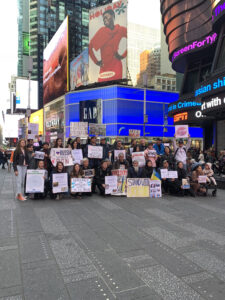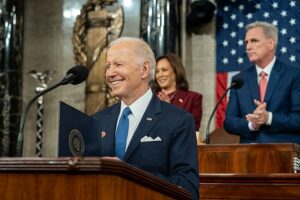Putin’s Latest Oblast: A Constructivist Perspective


Vladimir Putin’s decision to support a referendum in order to annex Crimea has sent a clear message to the international community: there is no set of rules or norms that will force Russia to behave in a certain manner. Although international institutions such as the United Nations were created to uphold international legal norms, the country’s annexation of Crimea reveals the tenuous nature of such norms. In the world of political theory, every state is treated as an actor that seeks to fulfill self-interests. These interests are based on paradigms predicted on the hope that the state falls within one of the conceptual frameworks which international relations can be analyzed. Putin’s decision to annex Crimea is in accordance with the Constructivist view.
In order to understand Putin’s decision, it is essential to explain the Russian government’s interests in Ukraine. After all, as Robert Keohane notes in Power and Interdependence (2011), rational actors “behave in a way that [is], by and large, rational, and therefore comprehensible to outsiders in rational terms.” Russia’s behavior is deemed rational according to Constructivists because the Russian Federation acted “towards objects, including other actors on the basis of what value those objects have as interpreted by the society in which the actor operates.” Crimea is of considerable value for the Russians due to its strategic location. Until the 1950’s, the peninsula was in fact considered part of the Soviet Union, until Nikita Khrushchev formally transferred it to the Ukrainian Soviet Socialist Republic. Sevastopol, the peninsula’s main city, has a port that gives the Russian fleet direct access to the Black Sea, allowing the Russian fleet to maintain its presence in Eurasia and counter NATO. However, after the Euromaidan movement beginning in late November 2013, with the protests in Kiev, Russia realized that a significant port city would be lost should Ukraine join the European Union. The prospect of Kiev joining the EU led Russia to enact contingency plans to take over Crimea. Further, the Constructivist view points out that cooperation will differ according to the way states view each other. In this case, Russia views NATO, particularly the United States, as a major threat to its sphere of influence.
On the other hand, Realists perceive the annexation solely as a way for Russia to flex its muscle and seek to gain power to counter the “Atlanticist” agenda of the EU/NATO. Even though this is partly true, it is not solely about power and security. Since the balance of power is something that naturally occurs in the international system, Russia’s behavior cannot be explained by classical realism because the Russian government has on multiple occasions cooperated with NATO in pursuit of shared objectives. Cooperation is something that rarely occurs in a Realist world. Supporters of Realism argue that Russia has annexed Crimea to maintain its sphere of influence. However, the same can be said of the United States. The United States on multiple occasions has warned Iran that any interference with its fleet in the Persian Gulf directly interferes with U.S. National Strategic interests.
The port city of Sevastopol has an essential function: it enables Russia to balance NATO’s power in the region. Russia wants to hold onto Crimea because without Sevastopol, Moscow perceives that it risks the loss of another post-Soviet state to NATO membership. Russian military action against Georgia in 2008, while not specifically aimed at preempting the country’s NATO bid, certainly had, from a Russian stance, the positive effect of derailing it. The destabilization of Ukraine, in both Crimea and the Donbas, had the same “positive” effect in the Kremlin’s eyes, as it makes EU entry and NATO membership impossible.
The realist view in this case might claim that the annexation of Crimea was the first step in Putin’s plan to reestablish Russian hegemonic power in Europe. But a more thorough look tells us that, in the past decade, Russia has tried to maintain the status quo rather than extend its influence in the region. The West and Russia are cooperating on multiple fronts, such as intensifying their efforts in fighting the Islamic State group as well as agreeing to pressure Iran to a comprehensive agreement on their nuclear program. Even though Realism comes close to explaining the annexation of Crimea, it falls short compared to Constructivism.
On the other hand, Liberals argue that there is an incentive for states to cooperate in order to reach their means, rather than jockey for power. As Michael Doyle notes in “Liberalism and World Politics,” capitalism is the ultimate determinant of power, with both democracy and commerce acting as important variables to gain the upper hand in the international system. This theory does not explain Russia’s annexation of Crimea sufficiently due to the fact that Russia is a major player in the global economy. Not only does Russia provide a great amount of energy to Western Europe, it also has a great amount of oil that it can sell to neighboring states. In the case of Crimea, Russia did not act based on economic reasons, but rather acted to protect its national interests. Liberals might argue that the recent sanctions placed on Russia will force the Russian government to retreat due to economic distress. On the contrary, Russia has so effectively integrated its energy sector with Western Europe that the majority of Europe’s energy is provided by Russia. States such as Germany and Italy are hesitant to place harsher economic sanctions in order to punish Russia for fear of gas and oil cutoffs: both nations obtain about a third of their energy imports from Russia. Countries such as Poland, Finland, Romania, Hungary, Lithuania, and the Czech Republic rely on even higher percentages of Russian gas and oil for their energy needs. And France and the U.K., while less dependent on Russian energy, do not want to risk profitable banking and armaments deals with Russian firms. This calculus was proven during the 2008 Russo-Georgian War, over which Russia endured no serious response from the “Atlanticist” camp that adversely affected Russo-European trade. In 2015, Putin is now even willing to risk sanctions against national energy champion Gazprom by allowing his handpicked chairman there to begin selling gas to Ukrainian separatists in the Donbas. It is worth noting here that the EU has never made a serious effort to stop Moldovan separatists from taking Gazprom deliveries – which allow Moscow to continue influencing the politics of the former Soviet republic. Should this pattern repeat itself in Ukraine, precedent suggests Gazprom will be able to continue doing business with its Western European customers.
Furthermore, in contrast to the notion that non-state actors and institutions such as the United Nations play a major role in facilitating cooperation between states, non-state actors in fact played a minimal role in preventing the annexation of Crimea. Vitaly Churkin, the Permanent Representative of Russia to the United Nations, has told the Security Council multiple times that Crimea is a vital port city that the Russian Federation cannot and will not lose. In addition, since Russia has veto power in the Security Council, it can block any multilateral action stemming from the U.N. Moreover, Liberalism stresses the notion that economic and commercial wealth plays a great factor in facilitating cooperation amongst states. Even though this might be the case with Iran or other smaller states, it does not apply to Russia due to its much larger and more integrated economy.
Even though Russia’s annexation of Crimea goes against the laws and norms of the international system, it is important to understand why Putin decided to do it. Although Crimea and Russia are historically linked together, the latter saw the 2013-2014 Ukraine political crisis as a direct threat to its ability to influence events in the periphery of its former empire. With more than a million Russian-speaking citizens residing in Crimea, Putin stirred up nationalistic feeling within Crimea to legitimize his claim. He said his actions were protecting the Russian population from the “insurgency” arising in Ukraine. The loss of control in Ukraine after the ousting of Yanukovich forced Russia to quickly react in order to re-exert its influence in the region, similar to what happened in Georgia. Then Russia quickly squashed out the protests by sending tanks and reinstalled order in the country. Even though the international system scolded Russia for its behavior, there were no significant repercussions for Putin.
Nonetheless, the conflict in Ukraine differs from the 2008 Russo-Georgian War because of the level of significance for both the West and Russia. For the United States, pulling Ukraine out of Russia’s orbit will weaken Russia and strengthen NATO; whereas maintaining the status quo will allow Russia to keep an important satellite state and sustain its regional influence. The realist approach focuses on the balance of power between the West and Russia, similar to the Cold War Era. It argues that in order for the Russian state to survive, it must invade neighboring states to maximize its influence. However, this is not the case when it comes to Crimea because the annexation of Crimea was taken in the wake of political instability. Although critics might argue that Russia does not have the legal right to interfere and invade a sovereign state, there is no single effective mechanism to monitor and enforce international law. The constructivist view argues that the perception of friends and enemies becomes a key determinant of a state’s behavior. Ukraine’s decision to consider joining the EU gave rise to the perception that Ukraine would like to align itself with NATO. For this reason, the annexation of Crimea can be best explained by the constructivist view because it is not simply about Russia wanting to create a hegemonic power and expand its area of influence, but rather, to protect what diminished influence it can exercise in its near abroad.
David Esmati is a second year M.A. student in International Relations. He earned his B.A. degree in International Relations Honors from New York University. He is interested in international security issues, Afghanistan-Pakistan, sustainable development, financing for development and peacebuilding and post-conflict recovery. His past work experience in related fields includes work with The Permanent Mission of Afghanistan to the United Nations, The United States Mission to the United Nations, NGO’s and think tanks. He is currently attempting to write a thesis on the effect of development aid to Afghanistan.






